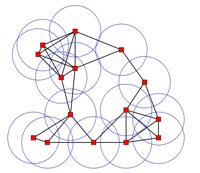Ross Kang, researcher at the Centrum Wiskunde & Informatica (CWI) in Amsterdam, received a Veni award from NWO, the Netherlands Organisation for Scientific Research. Having started at CWI in January 2012, he is studying randomness in networks in order to reveal hidden information, such as their structure and reliability. This mathematical research can be applied in telecommunications, bioinformatics, statistical physics and social networks. By randomly altering a network, Kang seeks to understand its underlying structure. The results might be useful for understanding and preventing network problems, such as power failures and malfunctioning internet services.
Kang says: “A good example of a network is the Web. Search engines like Google derive important information from the way web pages are connected: Pages that important organizations link to, are probably important themselves. To obtain better information about networks, we combine probability theory with graphs – mathematical structures that represent a network. We could, for instance, look at the consequences of random failures in grid-based power systems to get a better understanding of their reliability. Another example is the Skype network, which has only a few nodes of relatively high importance. The entire network is vulnerable to failure when these ‘super nodes’ are compromised, as was seen in worldwide Skype outages in 2010 and 2011.”

Picture: Unit disk graph, representing a network, for instance a mobile phone network. Source: David Eppstein. USA.
Before he came to CWI, Ross Kang held post-doctoral research positions at the School of Engineering and Computing Sciences, Durham University (UK) and at the School of Computer Science, McGill University (Canada). He obtained his doctorate at Oxford University. At CWI, he works in the Algorithms, Combinatorics and Optimization (PNA1) research group, led by Monique Laurent. His research interests include random networks, probabilistic combinatorics, geometric graphs, and probability theory.
More information:
http://homepages.cwi.nl/~kang
Source picture above (electricity network): Shutterstock.
